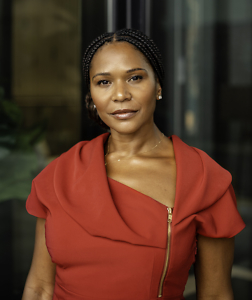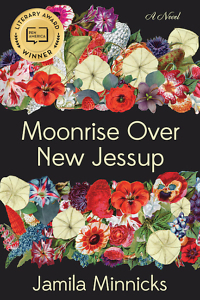From the Other Side of the Woods
A young woman learns to fight for her adopted hometown in Moonrise Over New Jessup
Shaken by her sudden and unsettling departure from the rural Alabama farmland where she grew up, Alice Young stumbles off a bus to find herself in a place she’d never imagined in 1957’s Jim Crow South: an all-Black town. Her relief and sense of wonder grow as she walks around the community known as New Jessup: “Up and down the avenue, Negroes of every shade came together like the dusk in a fall forest.”

Thus begins Moonrise Over New Jessup, the debut novel by Jamila Minnicks, winner of the 2021 PEN/Bellwether Prize for Socially Engaged Fiction. As Alice soon discovers, the proud band of citizens who built New Jessup have been engaged in a battle to protect the community since its inception.
Forged from swampland thick with ancient cypresses, New Jessup emerged as an enterprising town of all-Black businesses, hospitals, schools, and churches, but it technically remains a self-contained section of Jessup, the all-white city that drove its Black citizens — New Jessup’s founders — out of their homes and businesses and into the swamp. These white folks still pose dangers but largely do so “from the other side of the woods,” an expression that comes to convey a range of perspectives in this novel.
Though New Jessup still proves vulnerable to Jim Crow’s cruelties and indignities, Alice finds an apparent haven of safety there that she’s never known. She embraces her new life, working as a dress shop seamstress and a waitress in a diner. There she meets Raymond Campbell, whose charm and self-possession draw her in. The son of a respected business owner, Raymond represents a legacy of New Jessup’s male leaders who must now wrestle with the unique challenges that desegregation poses to a thriving all-Black community.
 Alice also meets Patience, a memorable character whose commitment to organizing for change in New Jessup makes Alice uneasy about upsetting the status quo. But Patience challenges her: What about the dangers faced by those who don’t have a town like this one? Alice’s own upbringing was rife with such dangers. Now she’s determined to keep this peaceful life she’s found, not bust it up in pursuit of changes that might do more harm than good. From her perspective, Patience “was forever talking about loving her people, but somebody had to actually love them.”
Alice also meets Patience, a memorable character whose commitment to organizing for change in New Jessup makes Alice uneasy about upsetting the status quo. But Patience challenges her: What about the dangers faced by those who don’t have a town like this one? Alice’s own upbringing was rife with such dangers. Now she’s determined to keep this peaceful life she’s found, not bust it up in pursuit of changes that might do more harm than good. From her perspective, Patience “was forever talking about loving her people, but somebody had to actually love them.”
Minnicks depicts many conflicting viewpoints on the protection and empowerment of Black citizens, always grounding her characters’ arguments in the particulars of their experience and background. Many of New Jessup’s older generation, for example, remember the town’s early days, including a legendary visit by Booker T. Washington. They defend the protective vision that first established their community.
Others, like Patience and Raymond, grew up enjoying the relative safety of a well-established New Jessup and view the needs of its future differently. They are drawn to the various civil rights groups working throughout the country, including Alabama. But to prevent town authorities from tossing them out for “agitating,” they must keep their organizing efforts clandestine.
Alice is our guide through these conflicts. Through tender and engaging narration, Alice’s interior life unfolds via poignant reflections on her farm-working family life, including her devoted but disrupted connection to her older sister Rosie, whose mysterious escape to Chicago (and subsequent disappearance) looms over her life now.
Alice’s rural consciousness weaves her love of nature into scene after scene, reminding us that her fight for a peaceful, loving home runs deep. Unlike many others of her generation, Alice has no desire to move to a far-off city, like Chicago or D.C. She wants to protect the land she loves.
Though she has trusted that the men of her community know how to wage this fight, Alice struggles to bring her own voice into the struggle. But to protect those she loves who are increasingly bound up in the conflicts over desegregation, she becomes “tangled in a world of stories” and “duty-bound to tell some-truths, half-truths, and non-truths” in order to keep everyone’s secrets. More and more, she feels trapped and compromised by mounting troubles that — despite all the debates raging around her — have no clear solutions.
Alice’s dilemma illuminates the question of how much cumulative weight can be borne by a single, fallible human heart, and her compelling inner life drives the narrative power of Moonrise Over New Jessup. Minnicks reveals this glimpse into the battle over desegregation via Alice’s world. This choice reflects Alice’s desire to show her long-lost sister the new home she loves and where she has chosen to fight for the dream of a peaceful life — to show her that “this, too, was Alabama.” Emi

Emily Choate is the fiction editor of Peauxdunque Review and holds an M.F.A. from Sarah Lawrence College. Her fiction and essays have appeared in Mississippi Review, storySouth, Shenandoah, The Florida Review, Rappahannock Review, Atticus Review, Tupelo Quarterly, and elsewhere. She lives near Nashville, where she’s working on a novel.


